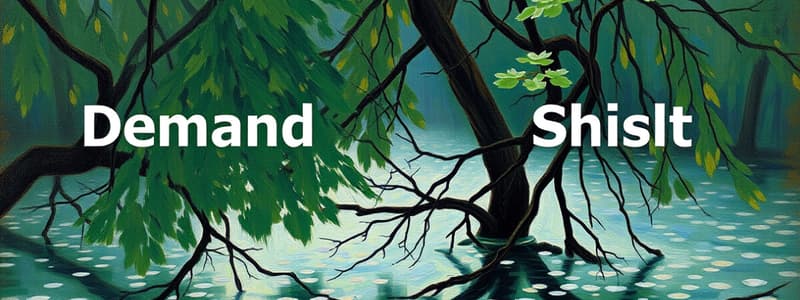Podcast
Questions and Answers
Which of the following are shifters of demand? (Select all that apply)
Which of the following are shifters of demand? (Select all that apply)
Which of the following are shifters of supply? (Select all that apply)
Which of the following are shifters of supply? (Select all that apply)
What is demand?
What is demand?
Demand is a consumer's desire and willingness to pay for a specific good or service.
What is supply?
What is supply?
Signup and view all the answers
Study Notes
Shifters of Demand
- Taste and Preference: Changes in consumer preferences can significantly affect demand for goods and services.
- Number of Customers: An increase or decrease in the consumer base can lead to increased or decreased demand.
- Price and Related Goods: Demand can be influenced by changes in the prices of substitute or complementary goods.
- Income: Consumer income levels directly impact their ability to purchase goods; higher income can increase demand for normal goods and decrease demand for inferior goods.
- Future Expectations: Anticipations regarding future prices or availability can influence current demand levels.
Shifters of Supply
- Price/Availability of Resources: The cost and availability of inputs affect producers' ability to supply goods.
- Number of Producers: An increase in producers leads to a greater supply in the market.
- Technology: Advancements in technology can enhance production efficiency, increasing supply.
- Government Action: Taxes can decrease supply, while subsidies can encourage greater production.
- Expectations of Future Profit: Expectations regarding future profitability can lead suppliers to adjust current supply levels, either increasing or decreasing based on anticipated market conditions.
Demand
- Represents the consumer's willingness to pay for a specific good or service.
- An inverse relationship exists between price and demand; as prices rise, demand typically falls, and vice versa.
Supply
- Indicates the total amount of a specific good or service available to consumers.
- Supply can be analyzed at a specific price or over a range of prices, often visualized through a supply curve on a graph.
Studying That Suits You
Use AI to generate personalized quizzes and flashcards to suit your learning preferences.
Description
Test your knowledge on the 5 shifters of demand and supply in this flashcard quiz. Understand concepts like consumer preferences and the impact of technology on production. Perfect for economics students seeking to reinforce their learning.




